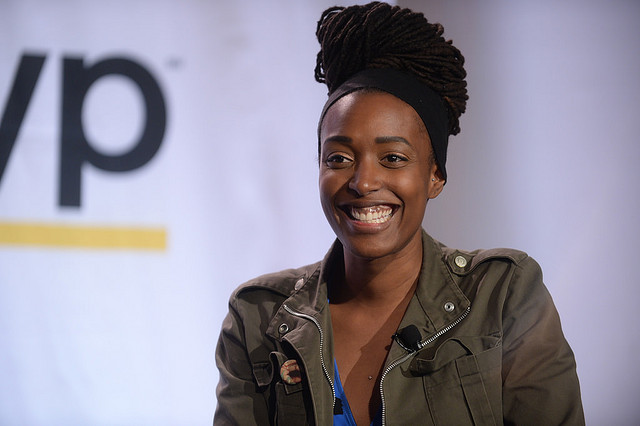Franchesca Ramsey of MTV’s Decoded Speaks Out About White Feminism and Intersectionality

The Sundance Film Festival is going on right now, and it’s a place where creators both established and up-and-coming are hawking their wares and conversing about the future of entertainment. Those conversations aren’t always easy ones. Writer/actor/comedian and host of MTV’s Decoded, Franchesca Ramsey, posted the above video to Snapchat and her Tumblr. In it, she discusses an incident she’d had the night before at Sundance when she tried to discuss the notion of intersectionality with other female creators, one of whom was Jill Soloway.
It’s a thought-provoking video and an important part of the current conversation surrounding diversity in the entertainment industry. In it, Ramsey expresses a continually frustrating problem for women of color when discussing feminism with white women. Mainly, that white feminists have a tendency to separate the idea of “woman” and the idea of “of color” as if “women of color” aren’t a thing, completely missing the entire point of intersectionality.
She also calls out one of the creator’s seemingly meager attempt at intersectionality ,by pointing out that if this woman is saying that she “can’t find” intersectional voices, she’s not looking hard enough.
Ramsey also talks about “respectability politics,” and how the entire notion is bullshit, because even when black women, and other women of color, don their “professional” voices, they still get treated like “Angry Black Women,” or get gaslit, or otherwise diminished and told that that they’re making a big deal over nothing, or that the concerns they’re raising don’t actually exist.
I agree with all of these things, and understand the frustration.
The one thing I do call into question is Ramsey’s use of the term “whitesplaining” when talking about a conversation between her and two Jewish women. While some Jews benefit from white privilege, and many Jews consider themselves white, it’s difficult to think of Jews as white (and many Jews adamantly disagree with that notion) when white people can decide whether or not they count as white at will.
Antisemitism is still a thing, here and around the world. You’ll notice that, while lots of Jews are employed in Hollywood, very few of them are are actually playing Jews. Save for shows like Transparent, or characters like Schmidt on New Girl or Ilana and Abby on Broad City, you rarely have Jews actively being Jews in film or TV unless it’s some kind of “Very Special Chanukah Episode” designed to score brownie points for – you guessed it – diversity. Too often, Jews are played by non-Jews, because people tend to conflate “Jews” and “White People” as The Same Thing, even when they’re not – politically or otherwise. And for all that Jews supposedly “run Hollywood,” there are very few Jewish stories actually being told, and when they are told, they’re usually about the Holocaust, much like black people usually have their stories praised the most when they’re about slavery. Jews are a minority group in the same way as other minority groups in how they are perceived and treated by mainstream culture. There is such a thing as “Christian privilege” in this country. It’s why Christmas is a National Holiday, but Jews have to take personal days for Rosh Hashanah and Yom Kippur.
Again, it’s very true that many Jews benefit from white privilege, and that’s something to be examined. But they shouldn’t necessarily be lumped in with “white people” or “white feminists” any more than white Latinos or Latinas can be lumped in with other white people. One would never accuse Oscar Isaac, Cameron Diaz, or Demi Lovato of “whitesplaining,”
So, while I agree wholeheartedly with the core of the points Ramsey made, and I sympathize and empathize with her frustrations, I don’t think that this particular point should go unexamined.
I’ve reached out to Ms. Ramsey for a statement, and will update this post if we hear back.
Thankfully, we have freedom of speech in this country and are capable of having difficult conversations like this without taking offense, as she elegantly points out in this recent episode of Decoded:
What do you think? How can we be better intersectional feminists? Let’s discuss in the comments below!
(featured image via Internet Week New York on Flickr)
—Please make note of The Mary Sue’s general comment policy.—
Do you follow The Mary Sue on Twitter, Facebook, Tumblr, Pinterest, & Google +?
Have a tip we should know? [email protected]